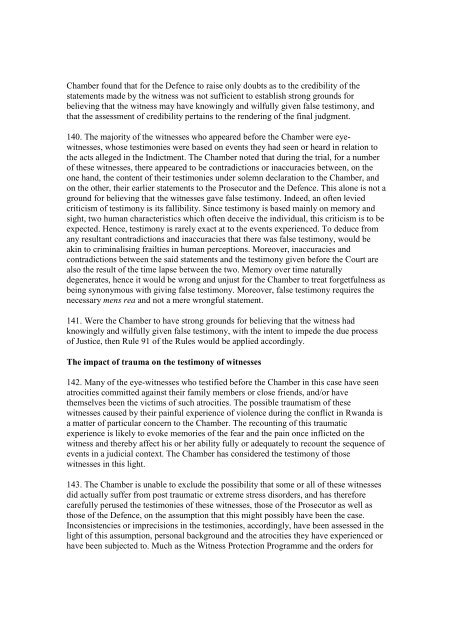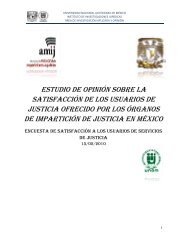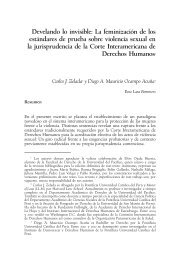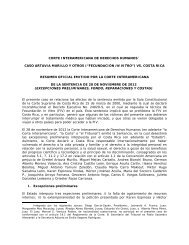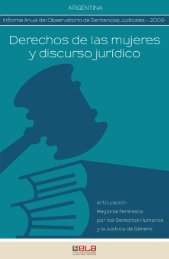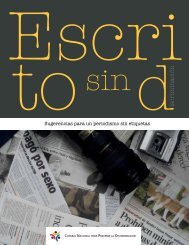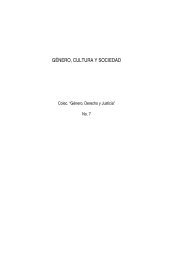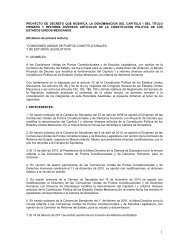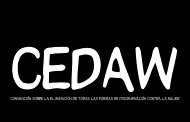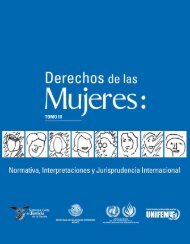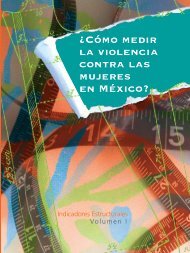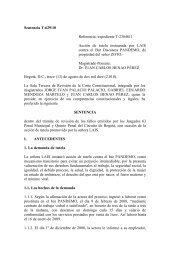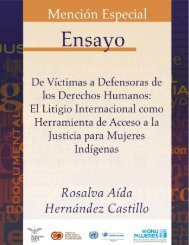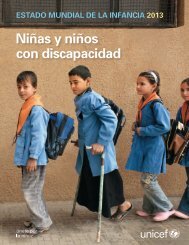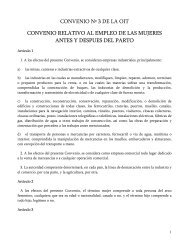Chamber found that <strong>for</strong> the Defence to raise only doubts as to the credibility of thestatements made by the witness was not sufficient to establish strong grounds <strong>for</strong>believing that the witness may have knowingly and wilfully given false testimony, andthat the assessment of credibility pertains to the rendering of the final judgment.140. The majority of the witnesses who appeared be<strong>for</strong>e the Chamber were eyewitnesses,whose testimonies were based on events they had seen or heard in relation tothe acts alleged in the Indictment. The Chamber noted that during the trial, <strong>for</strong> a numberof these witnesses, there appeared to be contradictions or inaccuracies between, on theone hand, the content of their testimonies under solemn declaration to the Chamber, andon the other, their earlier statements to the Prosecutor and the Defence. This alone is not aground <strong>for</strong> believing that the witnesses gave false testimony. Indeed, an often leviedcriticism of testimony is its fallibility. Since testimony is based mainly on memory andsight, two human characteristics which often deceive the individual, this criticism is to beexpected. Hence, testimony is rarely exact at to the events experienced. To deduce fromany resultant contradictions and inaccuracies that there was false testimony, would beakin to criminalising frailties in human perceptions. Moreover, inaccuracies andcontradictions between the said statements and the testimony given be<strong>for</strong>e the Court arealso the result of the time lapse between the two. Memory over time naturallydegenerates, hence it would be wrong and unjust <strong>for</strong> the Chamber to treat <strong>for</strong>getfulness asbeing synonymous with giving false testimony. Moreover, false testimony requires thenecessary mens rea and not a mere wrongful statement.141. Were the Chamber to have strong grounds <strong>for</strong> believing that the witness hadknowingly and wilfully given false testimony, with the intent to impede the due processof Justice, then Rule 91 of the Rules would be applied accordingly.The impact of trauma on the testimony of witnesses142. Many of the eye-witnesses who testified be<strong>for</strong>e the Chamber in this case have seenatrocities committed against their family members or close friends, and/or havethemselves been the victims of such atrocities. The possible traumatism of thesewitnesses caused by their painful experience of violence during the conflict in <strong>Rwanda</strong> isa matter of particular concern to the Chamber. The recounting of this traumaticexperience is likely to evoke memories of the fear and the pain once inflicted on thewitness and thereby affect his or her ability fully or adequately to recount the sequence ofevents in a judicial context. The Chamber has considered the testimony of thosewitnesses in this light.143. The Chamber is unable to exclude the possibility that some or all of these witnessesdid actually suffer from post traumatic or extreme stress disorders, and has there<strong>for</strong>ecarefully perused the testimonies of these witnesses, those of the Prosecutor as well asthose of the Defence, on the assumption that this might possibly have been the case.Inconsistencies or imprecisions in the testimonies, accordingly, have been assessed in thelight of this assumption, personal background and the atrocities they have experienced orhave been subjected to. Much as the Witness Protection Programme and the orders <strong>for</strong>
protection of witnesses issued by the Chamber during this trial were designed primarilyto reduce the danger <strong>for</strong> witnesses in coming to the <strong>Tribunal</strong> to testify, these measuresmay also have provided <strong>for</strong> some alleviation of stress. Reducing the physical danger tothe witnesses in <strong>Rwanda</strong>, and ordering the non-disclosure of their identities to the mediaand the public, as well as accommodating them during their presence at the seat of the<strong>Tribunal</strong> in safe houses where medical and psychiatric assistance was available, are, inany event, measures conducive to easing the level of stress.144. The Chamber has thanked each witness <strong>for</strong> his or her testimony during the trialproceedings and wishes to acknowledge in its judgment the strength and courage ofsurvivors who have recounted their traumatic experiences, often reliving extremelypainful emotions. Their testimony has been invaluable to the Chamber in its pursuit oftruth regarding the events which took place in the commune of Taba in 1994.Interpretation from Kinyarwanda into French and English145. The majority of the witnesses in this trial testified in Kinyarwanda. The Chambernotes that the interpretation of oral testimony of witnesses from Kinyarwanda into one ofthe official languages of the <strong>Tribunal</strong> has been a particularly great challenge due to thefact that the syntax and everyday modes of expression in the Kinyarwanda language arecomplex and difficult to translate into French or English. These difficulties affected thepre-trial interviews carried out by investigators in the field, as well as the interpretation ofexamination and cross-examination during proceedings in Court. Most of the testimonyof witnesses at trial was given in the language, Kinyarwanda, first interpreted intoFrench, and then from French into English. This process entailed obvious risks ofmisunderstandings in the English version of words spoken in the source language by thewitness in Kinyarwanda. For this reason, in cases where the transcripts differ in Englishand French, the Chamber has relied on the French transcript <strong>for</strong> accuracy. In some cases,where the words spoken are central to the factual and legal findings of the Chamber, thewords have been reproduced in this judgment in the original Kinyarwanda.146. The words Inkotanyi, Inyenzi, Icyitso/Ibyitso, Interahamwe and the expressions usedin Kinyarwanda <strong>for</strong> "rape", because of their significance to the findings of the Chamber,are considered particularly, as follows: The Chamber has relied substantially on thetestimony of Dr. Mathias Ruzindana, an expert witness on linguistics, <strong>for</strong> itsunderstanding of these terms. The Chamber notes that Dr. Ruzindana stated in histestimony that in ascertaining the specific meaning of certain words and expressions inKinyarwanda, it is necessary to place them contextually, both in time and in space.147. The origin of the term Inkotanyi can be traced back to the 19th Century, at whichtime it was the name of one of the warrior groups of a Rwandese king, King Rwabugiris.There is no evidence to suggest that this warrior group was monoethnic. Dr. Ruzindanasuggested that the name Inkotanyi was borne with pride by these warriors. At the start ofthe war between the RPF and the Government of <strong>Rwanda</strong>, the RPF army wing was calledInkotanyi. As such, it should be assumed that the basic meaning of the term Inkotanyi isthe RPF army. Based on the analysis of a number of <strong>Rwanda</strong>n newspapers and RTLM
- Page 2 and 3: 1.2. The Indictment1.3. Jurisdictio
- Page 4 and 5: eports2 which indicated that acts o
- Page 6 and 7: 3. Jean Paul AKAYESU, born in 1953
- Page 8 and 9: 16. Jean Paul AKAYESU, on or about
- Page 10 and 11: Counts 7-8(Crimes Against Humanity)
- Page 12 and 13: c) Deliberately inflicting on the g
- Page 14 and 15: 1.4. The Trial1.4.1. Procedural Bac
- Page 16 and 17: y the opening statement for the Def
- Page 18 and 19: y the Tribunal for crimes related t
- Page 20 and 21: 38. Regarding the Gishyeshye meetin
- Page 22 and 23: witness was lying because he or she
- Page 24 and 25: in the commune. His de facto author
- Page 26 and 27: 70. Apart from asking the prefect t
- Page 28 and 29: 84. According to the testimony of D
- Page 30: Scores of political leaders were im
- Page 33 and 34: his listeners to avoid the error of
- Page 35 and 36: 111. The killing of Tutsi which hen
- Page 37 and 38: killed on the grounds that the foet
- Page 39 and 40: 128. In conclusion, it should be st
- Page 41: Witness statements137. During the t
- Page 45 and 46: covered anyone who had anti-Tutsi t
- Page 47 and 48: Tutsi and the Tutsi were accused of
- Page 49 and 50: as "two armies", "two belligerents"
- Page 51 and 52: "The primary criterion for [definin
- Page 53 and 54: 180. Many witnesses testified regar
- Page 55 and 56: stated in that Decision, it did not
- Page 57 and 58: deeds. For these reasons, the Chamb
- Page 59 and 60: Concerning the allegation that at l
- Page 61 and 62: turned over alive to Akayesu, and t
- Page 63 and 64: younger brothers. He stated that he
- Page 65 and 66: 237. Karangwa testified under cross
- Page 67 and 68: three brothers lie on their stomach
- Page 69 and 70: known as Usuri (phonetic spelling)
- Page 71 and 72: Karangwa's explanation for the inco
- Page 73 and 74: Count 3, Crimes against Humanity (e
- Page 75 and 76: those killed were professors from R
- Page 77 and 78: 290. Witness DCC for the Defence, d
- Page 79 and 80: children, and old people. The Chamb
- Page 81 and 82: further that he had not heard of Ak
- Page 83 and 84: to fetch the one who remains', a pr
- Page 85 and 86: sector councillors called on the cr
- Page 87 and 88: According to witness A, the bourgme
- Page 89 and 90: present took it to mean that the Tu
- Page 91 and 92: 355. The Accused himself confirmed
- Page 93 and 94:
364. Paragraph 15 of the Indictment
- Page 95 and 96:
The witness said a certain Françoi
- Page 97 and 98:
has not been proved beyond reasonab
- Page 99 and 100:
who had come to his house. He said
- Page 101 and 102:
Interahamwe at the entrance, carryi
- Page 103 and 104:
ack to the bureau communal and on t
- Page 105 and 106:
Victim Y (Witness N), a [68] year o
- Page 107 and 108:
which were at times committed by mo
- Page 109 and 110:
communal into a forest in the area
- Page 111 and 112:
clubbing a young teacher who had be
- Page 113 and 114:
434. Two days after arriving at the
- Page 115 and 116:
he went into hiding during the mass
- Page 117 and 118:
ureau communal, but he insisted tha
- Page 119 and 120:
taken away from the bureau communal
- Page 121 and 122:
The Accused himself testified that
- Page 123 and 124:
464. In that case, when the matter
- Page 125 and 126:
"A person who planned, instigated,
- Page 127 and 128:
involve facilitating the commission
- Page 129 and 130:
493. In accordance with the said pr
- Page 131 and 132:
Deliberately inflicting on the grou
- Page 133 and 134:
y a psychological relationship betw
- Page 135 and 136:
Chamber notes that, as stated above
- Page 137 and 138:
• complicity by procuring means,
- Page 139 and 140:
547. Consequently, where a person i
- Page 141 and 142:
underscoring their commitment to se
- Page 143 and 144:
character134. In fact, the concept
- Page 145 and 146:
575. The definition of crimes again
- Page 147 and 148:
grounds mentioned in Article 3 of t
- Page 149 and 150:
accepted definition of this term in
- Page 151 and 152:
adopted primarily to protect the vi
- Page 153 and 154:
610. Whilst the Chamber is very muc
- Page 155 and 156:
description, namely, what constitut
- Page 157 and 158:
forces to plan and carry out concer
- Page 159 and 160:
635. There is no clear provision on
- Page 161 and 162:
7.2. Count 5 - Crimes against human
- Page 163 and 164:
663. The definition of crimes again
- Page 165 and 166:
677. The Tribunal notes that eviden
- Page 167 and 168:
685. In the light of its factual fi
- Page 169 and 170:
692. The Tribunal finds, under Arti
- Page 171 and 172:
determine, as far as each proven fa
- Page 173 and 174:
the Tutsi in general. Akayesu who h
- Page 175 and 176:
722. As regards the allegations in
- Page 177 and 178:
732. The rape of Tutsi women was sy
- Page 179 and 180:
Chamber finds beyond a reasonable d
- Page 181 and 182:
Footnote 11. Decision: Order for Co
- Page 183 and 184:
Footnote 41. Article 104 of the Loi
- Page 185 and 186:
Footnote 68. Dictionnaire Rwandais-
- Page 187 and 188:
Footnote 103. "Principles of Intern
- Page 189 and 190:
Footnote 134. Secretary General's R
- Page 191:
Footnote 171. See General Legal Fin


